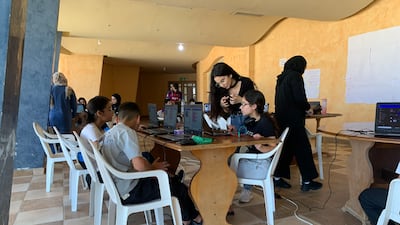Live updates: Follow the latest on Israel-Gaza
For months now, the children at the displacement centre at the Hotel Montana, in southern Lebanon, have faced a familiar routine characterised by boredom.
Sometimes they play tennis or football in the hotel's wide courtyard, but school is on hold and online learning almost impossible because of the shaky internet, meaning there is little to do.
Fresh arrivals come on an almost daily basis to the previously empty hotel, at the village of Marwanieh, halfway between the cities of Saida and Nabatieh. The owner is allowing the displaced to stay free of charge.
The children come from the dozens of families who call the hotel their temporary home. They fled there when hostilities broke out along the south Lebanon border last October between Hezbollah fighters and Israeli forces.
Not only have they been uprooted from their homes – all come from the border villages that dot the south Lebanese border, some of which have been destroyed in the fighting – but they’ve seen almost an entire school year collapse.
But for some 20 students, sat diligently at their laptops in a ground floor reception room, last week heralded something new and the prospect of picking up new skills.
With the help of local NGOs, coding and robotics classes have been taking place at the hotel turned shelter.
The classes are being implemented by CodeBrave, an organisation with around 25 teachers which seeks to give the children aged between 12 to 18 “essential 21st-century digital skills”.
“It’s very important because it’s closing a gap for the children. They have nothing to do. Of course they are benefiting from the education they are taking,” said Salam Badreddine, the head of the disaster management committee for the Saida-Zahrani area.
Teachers say that coding builds logical thinking, while also giving the displaced children a chance to disconnect from their everyday anxieties.
None of the children have coded before, while for many it also marks the first time they have used a laptop.
“Definitely it is getting them away from the stress they are living in … and learning things they never learnt in schools,” says Rania Said, a programme development co-ordinator from humanitarian aid charity World Vision, which is supporting the classes.
And while the classes mark a break from the routine that the Montana's residents have been facing, experts say coding and robotics are skills all children should be learning.
CodeBrave says the Middle East's digital economy is projected to grow four-fold between now and 2030.
“Yet, 88 per cent of Lebanese tech companies report being unable to find the tech talent they need. Lack of digital talent is the number one obstacle faced by start-ups in Lebanon and the tech skills gap in the region is well documented,” the organisation said.
“Access to tech education in Lebanon has become prohibitively expensive for the majority of young people, especially those from lower socio economic brackets.”
And the Lebanese government agrees over the importance of boosting tech skills. In its 2022-2023 crisis response plan, it highlighted that a tech-literate workforce is essential for Lebanon’s economic recovery.
“CodeBrave is responding to the urgent need to equip students with skills that align with the demands of the future workforce,” the Beirut-based organisation said.
An uncertain future
The surroundings at the Hotel Montana, with the large – but now empty – outdoor swimming pool, tall ceilings and marble flooring, speak of better days.
Medical experts have warned that the uncertainty of the residents over their situation is taking its toll. They have reported seeing an increase in anxiety disorders and depression among the displaced people.
Around 100,000 people have been displaced from the fighting, which has gradually escalated in its scope with seemingly no end on the horizon.
For the adults, Mr Badreddine says a big problem they face is obtaining work. The hotel is quite isolated in a relatively small town, and many are unable to afford to travel. While many might have had some savings when the conflict broke out, those have dried up as the situation drags on.
Mr Badreddine lists the villages that the Montana's residents come from – all places on the border to which they cannot return at the moment.
“They are from frontline villages,” he said. “It’s a risk to visit their homes because of the war.”


